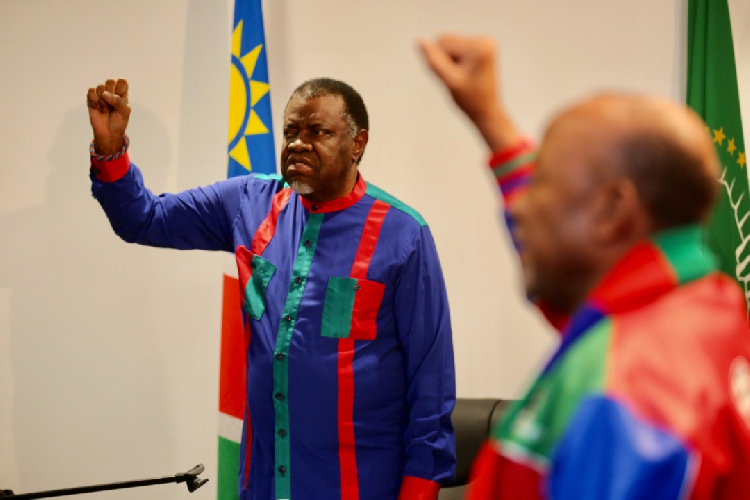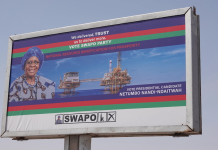
By Shinovene Immanuel, Sakeus Iikela, Tileni Monghudi and Mathias Haufiku | 31 July 2020
A VETERANS’ association warned the ruling party last weekend that more than 40 former liberation struggle generals are frustrated and feel excluded from Swapo.
This comment was made by Ben Shikongo, president of the Namibia National Liberation Veterans Association (NNLVA) at the party’s ‘introspection’ meeting in the capital last weekend.
The impact of several factors on the party’s poor performance in last year’s presidential and National Assembly elections were discussed.
These factors included independent candidates, Al Jazeera, infighting, tribalism and poor land delivery.
The role of veterans and claims that some generals are “playing cards at their villages” were also discussed, as well as how veterans of the liberation struggle are excluded from party structures.
A source said the generals claim they are being sidelined by younger people and are calling themselves the ’69-79 post-Tanga’ generation.
“The party should consider creating a veteran wing as a structure of the party, or making the association of veterans an affiliate of the party,” a document from the meeting reads.
This came amid whispers of the possible role of ex-military generals in Swapo’s leadership contests such as Swapo’s 2022 congress, where the ruling party will elect a leader to contest in the 2024 presidential election.
Other party members say talks of a veteran wing have been on the table for years.
The government has for years splashed millions of dollars on veterans in the form of projects and lump sums.
The NNLVA is also a fishing quota beneficiary in a joint venture accused of dodging taxes in Namibia.
For some generals this is reportedly not enough.
An ex-general was also said to have questioned the appointment of deputy minister of information and communication technology Emma Theofilus at the meeting.
DEMANDS
Shikongo, yesterday said 40 former liberation struggle generals are frustrated.

“The generals are just at their villages playing cards. It is unacceptable. They must be incorporated into the government structures and sent out to foreign missions,” he said.
He said Swapo is facing internal problems today because the party has sidelined the veterans, who are “the backbone of our party”.
Swapo’s founding president, Sam Nujoma, was also present at Saturday’s meeting and proposed that the party’s think tank be reformed to include party members such as veterans of the liberation struggle.
This would comprise former commanders and combatants of the People’s Liberation Army of Namibia, former political prisoners and others with institutional memory of the party.
Shikongo supported Nujoma’s suggestion and complained about the slow action of government-funded veterans projects.
He said he was happy though that the meeting has dealt with the issue of disunity in the party and that the veteran’s association would now be “taken on board”.
REFLECTION
The gathering was criticised for failing to invite leaders who publicly differ with the leadership.
Swapo leaders often pointed at outside factors, minutes of the meeting seen by The Namibian show.
The introspection meeting also found the independent candidate had a major impact on the 2019 elections.
The party now wants to introduce “clear legal effects for members to be expelled from the party if they do not support the elected candidate and resort to support opposition candidates”.
Swapo member Panduleni Itula has caused electoral chaos within Swapo since announcing his candidacy for the 2019 presidential polls.

Itula got the second highest number of votes at last year’s polls. Swapo is likely to face an onslaught of more independent candidates countrywide – especially in Windhoek and the Erongo region.
This appears to have pushed the ruling party to introduce a quota system to include young people in local authority elections.
“Out of seven members at least two must be youth, taking into account the zebra representation,” the Swapo document said.
The ruling party has for years faced allegations of smoking out charismatic grassroot young politicians in favour of youth leaders who are often seen as towing the line.
After admitting the party was at a crossroads, Nujoma on Saturday said the party seems to have lost the youth within its ranks, which could have serious implications for Swapo’s political growth and dominance.
He urged Swapo to field qualified and competent candidates for the upcoming regional and local authority council elections – not because they are ‘Team Harambee’ or ‘Team Swapo’, but because they are qualified, credible and competent.
Another topic discussed was land.
“Poor service delivery by the City of Windhoek, particularly on land delivery, coupled with an influx of people to urban areas were capitalised on by the opposition. They created a perception that the government is not capable,” the party said.
Swapo said the government has to acquire farms around Windhoek for a housing programme.
President Hage Geingob’s administration has for years paid lip service to the issue of land.
The Namibian reported five years ago that the Swapo-led City of Windhoek council locked itself in lease agreements for four farms around the city.
Some farms are rented out for as low as N$9 700 per month.
The outcome report states that factions culminated into fights at regional and local authority levels, a situation which had a subsequent “negative impact on service delivery”.
“Instil strict accountability measures for local councillors to the leadership of the party, in line with the constitutional confinement,” reads the report.
Factionalism aptly describes the path Swapo has walked over the past three decades of independence, characterised by internal differences and fierce jostling, and scarring the soul of the once-dominant liberation movement.
The party’s organisation and planning machinery was also singled out after it was revealed that campaign materials were not deployed timely and were sent to the regions late.
The meeting wants campaign materials to reach the regions two months before elections in future.
Swapo has also proposed the creation of an election campaign manager.
‘AL JAZEERA EFFECT’
The outcome report claimed the Fishrot documentary produced by Al Jazeera was strategically aired to discredit the party.
“The Al Jazeera effect also polluted the local political environment,” Swapo leaders said in the minutes of the meeting.
The documentary was, however, only aired on 1 December 2019, four days after the presidential and National Assembly elections.
Swapo’s post-mortem meeting resolved that the party must “develop counter-strategies to any emerging and unexpected political attacks from both domestic and external forces”.
The ruling party is set to host its elective congress in 2022 for the new leadership, but there are already concerns that tribal alignments are taking shape.
Swapo said tribalism has fuelled disunity in the party.
“The opposition has capitalised on that factor. An example of this is the Landless People’s Movement in the //Kharas region,” the Swapo report said.





